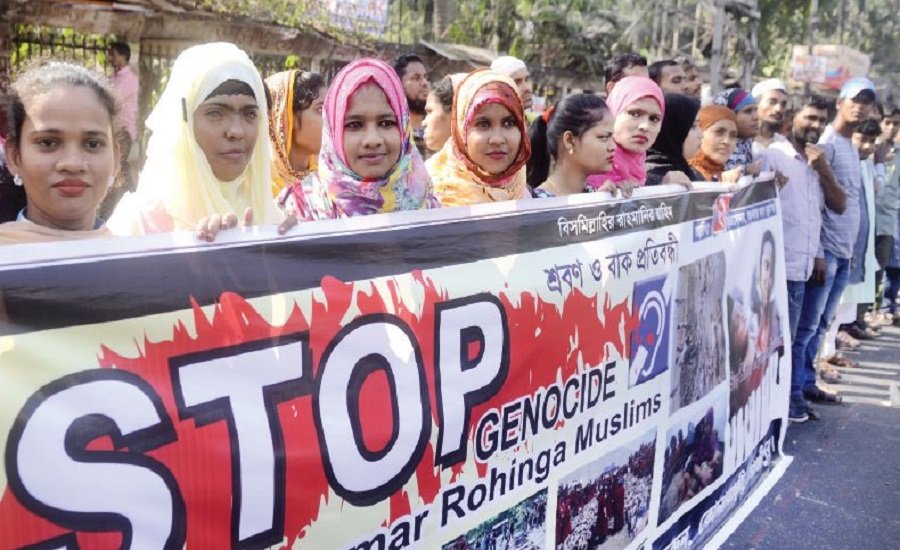
But beyond her many years of silence, Suu Kyi has also not lifted the state’s severe restrictions on humanitarian access to various regions of Burma
Ishaan Tharoor
THERE’S a population of around a million people living in fear right now, facing the likely wrath of an uncaring government that doesn’t seem to recognize their claim to the country they have always called home. The crisis along the Burma-Bangladesh border has dramatically intensified over the past week, with more than 125,000 Rohingya Muslims fleeing a Burmese military offensive in restive Rakhine state, according to aid organizations. Reports keep flooding in of mass killings carried out by Burmese security forces, as well as torture, rape and the systematic razing of Rohingya villages.
Burmese authorities say they are carrying out “clearance operations” against extremist “Bengali” insurgents — “Bengali” being a term the government uses to suggest Rohingyas are foreign interlopers rather than native Burmese. A growing chorus of Muslim leaders around the world has condemned Burma’s actions, which Turkish President Recep Tayyip Erdogan dubbed a “genocide.”
In the eye of the storm is Aung San Suu Kyi, Burma’s long-celebrated Nobel peace laureate who is the nation’s de facto civilian leader (she is formally barred from the presidency because members of her family are foreign citizens). For more than two decades, Suu Kyi occupied a hallowed place in the global imagination as a political prisoner, champion of democracy and relentless opponent of the brutal military junta that long dominated Burmese politics. She was, in essence, Asia’s Nelson Mandela, a picture of grace and moral authority.

I remember attending a lavish New York gala in her honor in 2012 during which she was feted by Henry Kissinger and other American luminaries. Kissinger hailed her at the time as an exemplar of how “societies become great when they turn confrontation into reconciliation.”
But when it comes to the Rohingya, Suu Kyi has shown little interest in “reconciliation.” Burma’s population is a fractious, multi-religious patchwork of dozens of ethnic groups, but no community has been more neglected than the Rohingya, whom the junta stripped of their citizenship rights in 1982. They have lived in apartheid-like conditions in Rakhine ever since, and observers see the growing insurgency there more as the symptom of decades of government abuse and persecution than the flourishing of foreign Islamist militant networks on Burmese soil.
Rights groups have warned of the vulnerability of the Rohingya for quite some time. In 2015, the U.S. Holocaust Museum even ranked Burma as the country most at risk of a campaign of genocide.
“The de facto leader needs to step in — that is what we would expect from any government, to protect everybody within their own jurisdiction,” said Yanghee Lee, the U.N.’s special rapporteur on human rights in Burma, who suggested that more than a thousand Rohingya have been killed over the past week.
Yet Suu Kyi has remained conspicuously silent about the reported atrocities, even as world leaders and the representatives of international organizations have issued a flurry of statements. Defenders of Suu Kyi argue that she has to walk a delicate line with the Burmese military, which not so long ago was her jailer and remains backed by an increasingly vocal constituency of Buddhist nationalists.

But beyond her many years of silence, Suu Kyi has also not lifted the state’s severe restrictions on humanitarian access to various regions of Burma affected by insurgency. Neither have authorities allowed independent news media to thoroughly investigate what is happening in Rakhine.
“I recognize that the armed forces retain great power in Burma, and that Aung San Suu Kyi does not exercise effective control over them,” wrote Guardian columnist George Monbiot. “I recognize that the scope of her actions is limited. But, as well as a number of practical and legal measures that she could use directly to restrain these atrocities, she possesses one power in abundance: the power to speak out. Rather than deploying it, her response amounts to a mixture of silence, the denial of well-documented evidence, and the obstruction of humanitarian aid.”
Indeed, in the past, her office has denied Rohingya allegations of rape as “terrorist fabrications” and played down both U.N. and international media reports detailing the suffering of the Rohingya as exaggerations. Last year, she even reportedly asked the United States not to invoke the word “Rohingya,” a reflection of the official Burmese position that the ethnicity of more than 1.3 million people does not formally exist.
“Silence, therefore, is the least of her sins. Silence also suggests a studied neutrality,” wrote Mehdi Hasan at the Intercept. “Yet there is nothing neutral about Aung San Suu Kyi’s stance. She has picked her side and it is the side of Buddhist nationalism and crude Islamophobia.”
c.washingtonpost.com

